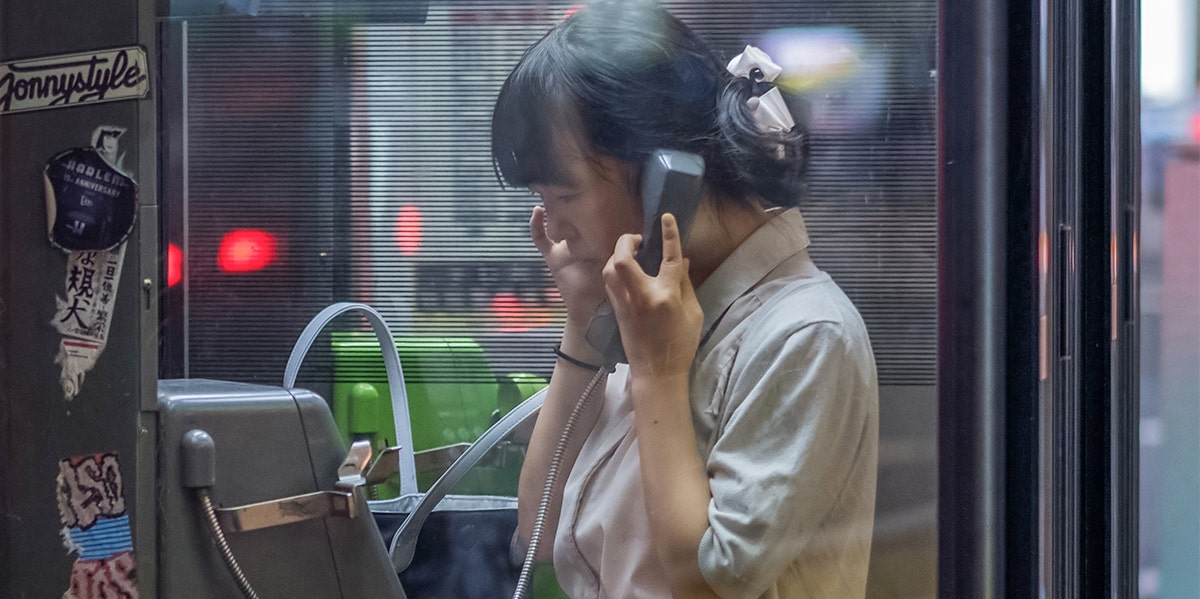How A Phone Booth In Japan Connects The Living And The Dead
The "phone of the wind" provides comfort to people around the world.
 MAHATHIR MOHD YASIN / Shutterstock
MAHATHIR MOHD YASIN / Shutterstock In a small garden in Otsuchi, Japan sits a tall, white phone booth with a phone with no connection. People travel from all over just to use the phone — to speak with relatives or loved ones who have died.
Nicknamed “the phone of the wind" or "wind phone" (風の電話, kaze no denwa in Japanese), the connection it provides to deceased loved ones is, as you can imagine, quite powerful.
And unlike the painful longing evoked by the seemingly similar connection in the 1964 "Night Call" episode of "The Twilight Zone," the modern phone line connecting the living and the dead is bringing much needed comfort to mourners around the world.
How did the "phone in the wind" come to be?
The phone booth was built by Itaru Sasaki, the owner of the garden, in 2010, shortly after he lost his cousin to cancer and a few months before one of the largest nuclear disasters since Chernobyl.
Sasaki opened it to the public in 2011, following the devasting tsunami in Japan's Tōhoku region that claimed the lives of over 20,000 people. Since then, it has remained popular among locals and tourists alike.
"There are many people who were not able to say goodbye," Itaru said. "There are families who wish they could have said something at the end, had they known they wouldn't get to speak again."
In 2017, Sasaki published a book full of his reflections on having created the phone booth titled "Kaze no Denwa – Daishinsai Kara Rokunen, Kaze no Denwa o Tooshite Mieru Koto" (in English, "The Phone of the Wind: What I Have Seen via the Phone in the Six Years Since the Earthquake"). Since then, two novels have been based on his creation, as well as an Austrian short film and the Japanese feature-length drama, "Voices in the Wind."
Recently, Itaru was contacted about setting up similar phone booths in Europe so that survivors of Covid-19 may call their loved ones who have died from the virus.
Replicas currently exist in Oakland, California; Dublin, Ireland; Tahara, Aichi Prefecture, Japan; Provincetown, Massachusetts; Marshall, North Carolina; Aspen Mountain, Colorado; and perhaps most recently, Olympia, Washington.
"Just like a disaster, the pandemic came suddenly and when a death is sudden, the grief a family experiences is also much larger," the 76-year-old said.
Many of the people who use the phone booth say it helps them come to terms with their losses, as well as giving them a place to feel connected to those they grieve. In many ways, it can also serve as a place to pray.
Kazuyoshi Sasaki, a survivor of the 2011 tsunami, frequently visits the booth to speak with his wife, Miwako, who died in the disaster.
He dials the number and stands while talking to his wife via the unconnected telephone line.
"It all happened in an instant, I can't forget it even now," he says to her, crying. "I sent you a message telling you where I was, but you didn't check it."
On that day 10 years ago, he searched through evacuation centers and makeshift morgues in the hope of finding his wife. At the end of each day, he would return to his empty, broken-down house.
"When I came back to the house and looked up at the sky, there were thousands of stars, it was like looking at a jewel box," the 67-year-old says. "I cried and cried and knew then that so many people must have died."
He signs off from the call by letting her know that a recent doctor’s check-up went well and that he has lost some weight.
"I'll take care of myself," Kazuyoshi assures his love. "I'm so glad we met, thank you, we're all doing what we can, talk soon.”
The Wind Phone’s Ongoing Impact
On the 10-year anniversary of both the booth and of the tsunami that devastated so many, its impact continues to reach more corners of the Earth and the number of people visiting the booth remains steady.
The coastal communities that were affected by that particular natural disaster still feel its effects today, and the phone booth serves as a light of hope to them and to others in times of darkness.
Surviving loved ones must grieve and move on after such tragic loss, but their connection to the departed lives on forever.
And thanks to this tall, white phone booth in the middle of a peaceful garden, the connection itself can remain alive.
Tomás Diniz Santos is a writer living in Orlando, Florida. He covers news, entertainment, and pop-culture topics.

